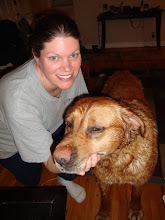I walked Rex one day that first week and we passed a house with a "Wage Peace" sign posted to a metal fence. Rex lifted his leg and turned on the faucet. The sign dripped dog pee. Peace was not something Rex wanted to preserve.
A week later, on the same walk, Rex peed on a second sign posted in the same yard. I looked around but luckily no one saw. Rex had waged war. There would be no peace. Only pee. Just like in war, he was marking his territory, all over the neighborhood. We wondered where all the pee came from. He seemed to void but there was always something left to make his mark elsewhere if he chose.
After that, I loaded Rex into my too-small-for-a-105-pound-dog Honda Prelude to do errands. He wanted to go for a car ride. What dog wouldn't? Alas, I had a black "Wage Peace" button stuck into the mustard-colored dash. Rex's tail immediately swatted the button out of place and onto the floorboards. There would be no peace in that little car or on that car ride either.
In Writing Fiction (5th ed.), one of the writing craft books I was reading at the time, Janet Burroway says, every story needs conflict. Without that, there is no story. The main character must run into trouble.
"Only trouble is interesting" (29), Burroway says.
Charles Baxter adds to this in Burning Down the House, as qtd. in Writing Fiction:
"Say what you will about it, Hell is story-friendly. If you want a compelling story, put your protagonist among the damned. The mechanisms of hell are nicely attuned to the mechanisms of narrative. Not so the pleasures of Paradise. Paradise is not a story. It's about what happens when the stories are over" (29).
The question that I wasn't sure how to answer in this story was this: Who was the protagonist? Who would be trying to get us out of this trouble? Maybe there was more than one.
I had found trouble--the conflict-loving dog definitely qualified. This was a story and I was actually living it.

No comments:
Post a Comment
Note: Only a member of this blog may post a comment.